Butchers
Extracted from Middle Straight Road by Bob Bartlett
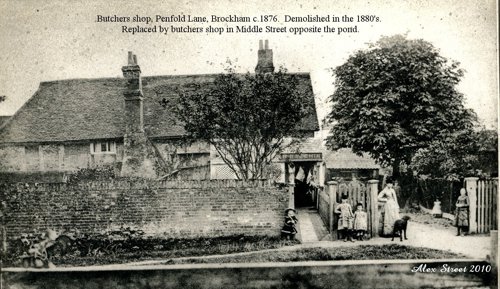
image kindly supplied by Alex Street
In 1921, a sale prospectus for the Deepdene estate has this as lot 47: "The Butcher's Shop and land." The house is well built of brick and tiled roof and the accommodation, a fine modern shop, parlour, kitchen with range, scullery with pump and copper, larder and sitting room and four bedrooms. Outside buildings: timber and tiled stable for three, harness room, coach-house and loft over; a brick and tiled slaughter house with copper, three pounds and a loft totalling two roods. Tenant paying rent of £35 per annum and also the rates. Adjoining was a productive garden, lot 48, of 24 perches yielding £3 per annum. Access by way of a public footpath.
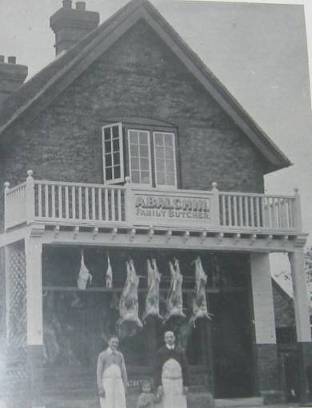
Len Jordan: Aberdeen Housewas occupied by Mr. Arthur Balchin and family. Mr. Balchin had previously been the butcher (hence Balchin's pond) as it is still known to a lot of people. One of his son's (Doug) eventually became
landlord of the Duke's Head. Mr. Balchin's two youngest sons were Norman and Percy, both like me, loving their cricket. Percy and I spent many an hour on the Green during school holidays, with bat and ball.
The Balchin family who lived at Denmark House on The Green ran the butchers before the Humphries and then the Chitty family. Mrs Humphreys moved to The Green, opened a sweet shop in her house and for many years was a Trustee of Poland House. She was the mother of Mrs Mary Roberts who is now resident on The Green.
Charlie Humphrey acquired the Butchers shop - Aberdeen House, in Middle Street in 1934 with his father. Charlie married Dorothy in 1934. "Humphrey's the Butchers" was home to Charlie, Dorothy and their children during the war. These are some of Dorothy's recollections....
Charlie was living in Leatherhead when he and his father purchased the butchers in 1933. He was a little older than me and my father would not let us marry until I was 18. We married in 1934 and moved to Brockham. The years before the war we had a well stocked shop, but at first no fridges, the meat was delivered encased in large blocks of ice. However by the time war
started the walk in fridges had been installed.
When the war began we lost some of the staff and I had to work in the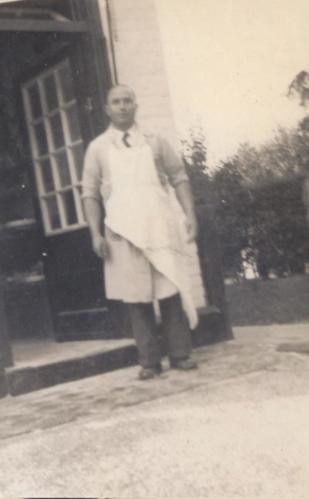
shop. We were open until eight o'clock every Saturday evening. One customer would arrive just before closing time every week, he always said - What have you got left that's cheap! We of course had to clear the stock."
Beef was very popular. Charlie owned his own slaughter house and used to buy from many local farmers. The Humphrey sausages were very popular and customers used to order them and we would post them all over the country. We used to get a lot of New Zealand lamb and other meat from a wholesaler in Croydon. I believe they are still trading today. The men used to go out collecting orders as far as Newdigate, Leigh, Buckland, Betchworth and around Brockham on a Tuesday for delivery on a Friday or Saturday"
Ration book coupons entitled you to 1/2d worth of meat per person a week. At the time New Zealand lamb was priced at 1/- a pound for leg of lamb and 10d per pound for shoulder. If we couldn't get enough meat from Croydon
or local farmers Charlie would drive up to Smithfield Market and come home and eat an enormous breakfast."
During the war Charlie was in the ARP, checking blackouts and that everyone was safe and well. He'd have to knock on doors and tell the occupants if they had any light showing, and to get home and off the streets if the sirens sounded. We had a shelter built onto the side of the house with thick brick walls. We slept here each night with the children. During the day if the sirens sounded we would shelter under the stair . If customers had insufficient time to get home they would join us under the stairs! I think it's something we all became accustomed to.
As the meat ration went down and down Charlie would go to Billingsgate Market twice a week. This was a fairly treacherous journey in itself. He'd come home with herrings and white fish mainly but sometimes with crabs and lobsters."
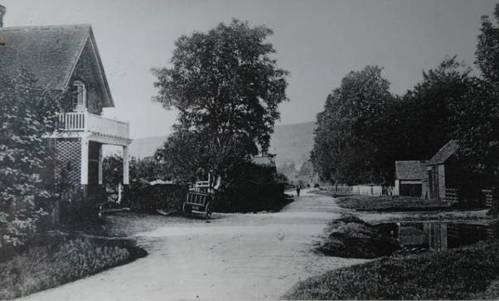
These were boiled up in an old stone copper in the slaughter house. I used to sell the fish from the house - the smell would have tainted any meat we did have!" We had to sell the shop after Charlie had an operation on his shoulder and could no longer lift the heavy sides of meat or chop the joints. We moved to the little shop on the Village Green - Ashdowns. This was owned by my brother. Charlie died unexpectedly in 1969 and I ran the shop until 1972.
The memory of Charlie Humphrey lives on. Every year the pig roasted on Bonfire Night rekindles a tradition begun soon after the war. This specially bred pig was introduced by Charlie. The supplier is secret and only one such pig is produced each year. For nearly fifty years this phenomena has fascinated thousands of bonfire night revellers and I am sure it will do so for
many more."
Mary Roberts nee Humphries: My parents, Charles and Dorothy Humphries moved to Aberdeen House in 1934 where my father was the butcher until he died in 1969. The family kept Jersey cows in the field that is now known as
Middle Green and they were looked after by an elderly man named Norris. I
remember him churning milk to make butter in our kitchen.My father also had
cows on a field that was once in the grounds of Brockham manor before it was
sold in plots for housing by Trustees. At some stage fish was sold and my
father would go to Billingsgate market to collect it. My mother was a Trustee
for Poland House for twenty two years and introduced the WI to the village in
1934. After my father died my mother moved to 1 Oak Cottages on the Green, now known as Ashdow Cottage and ran a newsagent and sweetshop there.?
Extracted from Mrs Daisy Parker nee Funnell Growing up in Old School Lane:
'When I was thirteen I worked Saturday mornings in the office of the local butcher shop in the village. My job was to copy the entries in from the day book to the ledger. I loved it as I thought I was doing something grown up. Mr and Mrs Humphrey were lovely people to work for and they taught me so much. When I left school, I went to work for them full time. I was then on the till, taking the money and giving change as well as keeping the ledgers up-to-date.'
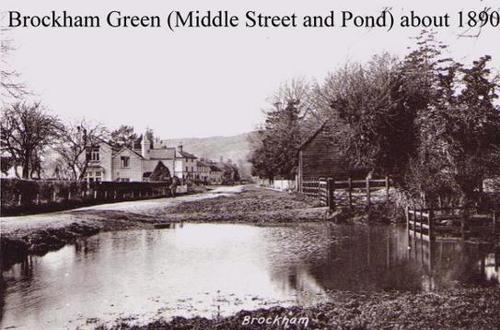
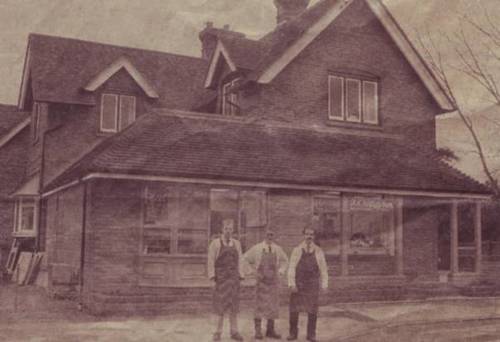
Chitty's around 1980 - Reg Chitty, Simon Budd and Richard

